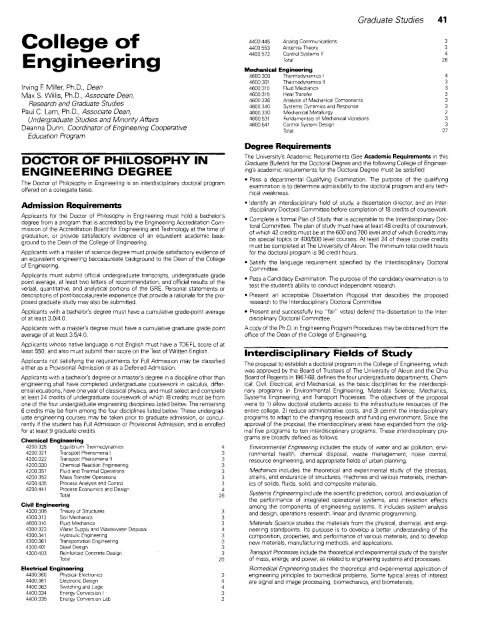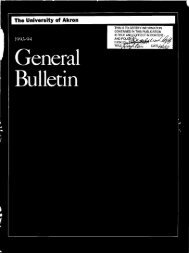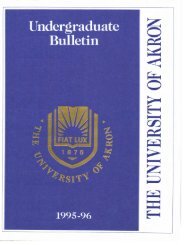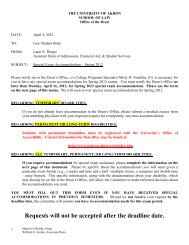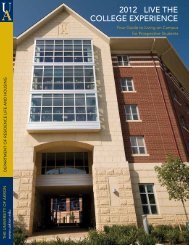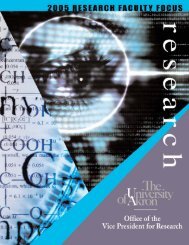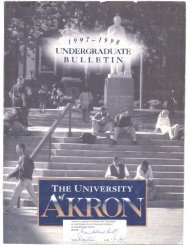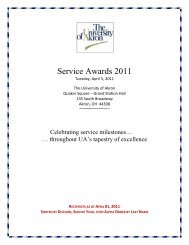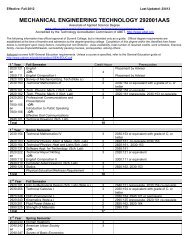College <strong>of</strong>EngineeringIrving F Miller, Ph.D., DeanMax S. Willis, Ph.D., Associate Dean,ReseardJ and <strong>Graduate</strong> StudiesPaul C. Lam, Ph.D., Associate Dean,Undergraduate Studies and M!rwrity AffairsDeanna Dunn, Coordinator <strong>of</strong> Engineering CooperativeEducation ProgramDOCTOR OF PHILOSOPHY INENGINEERING DEGREE<strong>The</strong> Doctor <strong>of</strong> Philosophy in Engineering is an interdisciplinary doctoral program<strong>of</strong>fered on a collegiate basis.Admission RequirementsApplicants for the Doctor <strong>of</strong> Philosophy in Engineering must hold a bachelor'sdegree from a program that is accredited by the Engineering Accreditation Commission<strong>of</strong> the Accreditation Board for Engineering and Technology at the time <strong>of</strong>graduation, or provide satisfactory evidence <strong>of</strong> an equivalent academic backgroundto the Dean <strong>of</strong> the College <strong>of</strong> Engineering.Applicants with a master <strong>of</strong> science degree must provide satisfactory evidence <strong>of</strong>an equivalent engineering baccalaureate background to the Dean <strong>of</strong> the College<strong>of</strong> Engineering.Applicants must submit <strong>of</strong>f1cial undergraduate transcripts, undergraduate gradepoint average, at least two letters <strong>of</strong> recommendation, and <strong>of</strong>ficial results <strong>of</strong> theverbal, quantitative, and analytical portions <strong>of</strong> the GRE. Personal statements ordescriptions <strong>of</strong> post-baccalaureate experience that provide a rationale for the proposedgraduate study may also be submitted.Applicants with a bachelor's degree must have a cumulative grade-point average<strong>of</strong> at least 3.0/4.0Applicants with a master's degree must have a cumulative graduate grade pointaverage <strong>of</strong> at least 3.5/4.0.Applicants whose native language is not English must have a TOEFL score <strong>of</strong> atleast 550, and also must submit their score on the Test <strong>of</strong> Written English.Applicants not satisfying the requirements for Full Admission may be classifiedeither as a Provisional Admission or as a Deferred Admission.Applicants with a bachelor's degree or a master's degree in a discipline other thanengineering shall have completed undergraduate coursework in calculus, differentialequations, have one year <strong>of</strong> classical physics, and must select and completeat least 24 credits <strong>of</strong> undergraduate coursework <strong>of</strong> which 18 credits must be fromone <strong>of</strong> the four undergraduate engineering disciplines listed below. <strong>The</strong> remaining6 credits may be from among the four disciplines listed below. <strong>The</strong>se undergraduateengineering courses may be taken prior to graduate admission, or concurrentlyif the student has Full Admission or Provisional Admission, and is enrolledfor at least 9 graduate credits.Chemical Engineering4200 325 Equli1bnum <strong>The</strong>rmodynamiCS4200:321 Transport Phenomena I4200:322 Transport Phenomena II4200:330 Chemical Reaction Eng1neenng4200:351 Fluid and <strong>The</strong>rmal Operations4200:353 Mass Transfer Operations4200:435 Process Analysis and Control4200:441 Process Econom1cs and Des1gnTotalCivil Engineering4300:306 <strong>The</strong>ory <strong>of</strong> Structures4300.313 So1l Mechanics4600:310 Fluid Mechanics4300:323 Water Supply and Wastewater Disposal4300.341 Hydraulic Engineering4300:361 Transportation Engineering4300:401 Steel Des1gn4300:403 Reinforced Concrete DesignTotalElectrical Engineering4400:360 Physical ElectroniCS4400:361 Electronic Design4400·363 Switching and Logic4400:334 Energy Conversion I4400:335 Energy Convers1on Lab43333334263334333325344324400:4454400:5534400:572Analog CommunicationsAntenna <strong>The</strong>oryControl Systems IITotalMechanical Engineering4600:300 <strong>The</strong>rmodynamics I4600:301 <strong>The</strong>rmodynamics II4600:310 Flu1d Mechanics4600:315 Heat Transfer4600:336 Analysis <strong>of</strong> Mechanical Components4600:340 Systems Dynam1cs and Response4600:330 Mechanical Metallurgy4600:531 Fundamentals <strong>of</strong> Mechanical Vibrations4600:541 Control System DesignTotalDegree Requirements<strong>Graduate</strong> Studies 41<strong>The</strong> <strong>University</strong>'s Academic Requirements (See Academic Requirements in this<strong>Graduate</strong> Bulletin) for the Doctoral Degree and the following College <strong>of</strong> Engineering'sacademic requirements for the Doctoral Degree must be satisfied.• Pass a departmental Qualifying Examination. <strong>The</strong> purpose <strong>of</strong> the qualifyingexamination is to determine admissibility to the doctoral program and any technicalweakness.• Identify an interdisciplinary field <strong>of</strong> study, a dissertation director, and an InterdisciplinaryDoctoral Committee before completion <strong>of</strong> 18 credits <strong>of</strong> coursework.• Complete a formal Plan <strong>of</strong> Study that is acceptable to the Interdisciplinary DoctoralCommittee. <strong>The</strong> plan <strong>of</strong> study must have at least 48 credits <strong>of</strong> coursework,<strong>of</strong> which 42 credits must be at the 600 and 700 level and <strong>of</strong> which 6 credits maybe special topics or 400/500 level courses. At least 24 <strong>of</strong> these course creditsmust be completed at <strong>The</strong> <strong>University</strong> <strong>of</strong> <strong>Akron</strong>. <strong>The</strong> minimum total credit hoursfor the doctoral program is 96 credit hours.• Satisfy the language requirement specified by the Interdisciplinary DoctoralCommittee.• Pass a Candidacy Examination. <strong>The</strong> purpose <strong>of</strong> the candidacy examination is totest the student's ability to conduct independent research.• Present an acceptable Dissertation Proposal that describes the proposedresearch to the Interdisciplinary Doctoral Committee.• Present and successfully (no "fail" votes) defend the dissertation to the InterdisciplinaryDoctoral Committee.A copy <strong>of</strong> the Ph.D. in Engineering Program Procedures may be obtained from the<strong>of</strong>fice <strong>of</strong> the Dean <strong>of</strong> the College <strong>of</strong> Engineering.Interdisciplinary Fields <strong>of</strong> Study<strong>The</strong> proposal to establish a doctoral program in the College <strong>of</strong> Engineering, whichwas approved by the Board <strong>of</strong> Trustees <strong>of</strong> <strong>The</strong> <strong>University</strong> <strong>of</strong> <strong>Akron</strong> and the OhioBoard <strong>of</strong> Regents in 1967-BB, defines the four undergraduate departments, Chemical,Civil, Electrical, and Mechanical, as the basic disciplines for the interdisciplinaryprograms in Environmental Engineering, Materials Science, Mechanics,Systems Engineering, and Transport Processes. <strong>The</strong> objectives <strong>of</strong> the proposalwere to 1) allow doctoral students access to the infrastructure resources <strong>of</strong> theentire college, 2) reduce administrative costs, and 3) permit the interdisciplinaryprograms to adapt to the changing research and funding environment. Since theapproval <strong>of</strong> the proposal, the interdisciplinary areas have expanded from the originalfive programs to ten interdisciplinary programs. <strong>The</strong>se interdisciplinary programsare broadly defined as follows.Environmental Engineering includes the study <strong>of</strong> water and air pollution, environmentalhealth, chemical disposal, waste management, noise control,resource engineering, and appropriate fields <strong>of</strong> urban planning.Mechamcs includes the theoretical and experimental study <strong>of</strong> the stresses,strains, and endurance <strong>of</strong> structures, machines and various materials, mechanics<strong>of</strong> solids, fluids, solid, and composite materials.Systems Engineering include the scientific prediction, control, and evaluation <strong>of</strong>the performance <strong>of</strong> integrated operational systems, and interaction effectsamong the components <strong>of</strong> engineering systems. It includes system analysisand design, operations research, linear and dynamic programming.Materials Science studies the materials from the physical, chemical, and engineeringstandpoints. Its purpose is to develop a better understanding <strong>of</strong> thecomposition, properties, and performance <strong>of</strong> various materials, and to developnew materials, manufacturing methods, and applications.Transport Processes include the theoretical and experimental study <strong>of</strong> the transfer<strong>of</strong> mass, energy, and power, as related to engineering systems and processes.Biomedical Engineering studies the theoretical and experimental application <strong>of</strong>engineering principles to biomedical problems. Some typical areas <strong>of</strong> interestare signal and image processing, biomechanics, and biomaterials.3342643333323327
42 <strong>The</strong> <strong>University</strong> <strong>of</strong> <strong>Akron</strong>Polymer Engineering combines fundamental engineering principles with thestructure and rheological properties <strong>of</strong> polymers to design and analyze polymerprocesses and equipmentEng1neenng Appl1ed Mathemat1cs appi1es advanced mathematics to teohnologlcallySignificant engineering problems.Chem1cal Reactions and Process Engineering studies ohem1cal reactions, homogeneousohemical reactions, heterogeneous chemical react1ons, and catalysis asapplied to process eng1neering.Microscale Pny51ochem1cal Engineering studies small particles, surface science,agglomeration, and separation as applied to process eng1neering.<strong>The</strong> interdisc1pl1nary doctoral program has succeeded in providing doctoral studentsaccess to the resources <strong>of</strong> the entire college while providing an economicallysound administration for a program that deals with a doctoralpopulation that 1s much smaller than those tor undergraduate or master'sdegrees.COORDINATED ANDJOINT PROGRAMSCoordinated Engineering AppliedMathematics program for the Doctor<strong>of</strong> Philosophy in Engineering degreebetvveen the College <strong>of</strong> Engineeringand the Department <strong>of</strong> MathematicalSciences<strong>The</strong> faculty 1n the College <strong>of</strong> Engineering and the Department <strong>of</strong> MathematicalSciences have agreed to prov1de a coordinated program, subject to the followingconditions, tor those graduate students who elect the interdisciplinary field <strong>of</strong>Engineering Applied MathematiCS.Admission RequirementsApplicants tor the Engineering Appl1ed Mathematics Program must have theirgraduate appl1cat1on and credentials evaluated by one <strong>of</strong> the departments in theCollege <strong>of</strong> Engineenng and the Department <strong>of</strong> Mathematical Sciences. <strong>The</strong>Admission Requirements for the Doctor <strong>of</strong> Philosophy in Engineering, as given inthe <strong>Graduate</strong> Bulletin, shall apply to all applicants for the Engineering Appl1edMathematics ProgramDegree Requirements<strong>The</strong> applicable Degree Requirecnents tor the Engineering Appl1ed MathematicsProgram are those g1ven in the <strong>Graduate</strong> Bulletin under the section Doctor <strong>of</strong> Ph~losophy in Engineenng <strong>The</strong>se degree requirements include pass1ng a QualifyingExamination, identifying a D1ssertat1on Directm, establishing an InterdisciplinaryDoctoral Committee, completing a formal Plan <strong>of</strong> Study, satisfying the <strong>University</strong>'slanguage and residency requ1rement, pass1ng a Candidacy Examination, presentingan acceptable Dissertation Proposal, writing a dissertatiOn, and publicly andsuccessfully (no 'fail" votes) defending the dissertation before the InterdisciplinaryDoctoral Committee.Students in the Eng1nee11ng Applied Mathemat1cs Program must pass a departmentalQualifying Exam1nation composed and administered by the participating facultyfrom the Department <strong>of</strong> Mathematical Sciences and the participating facultyfrom one <strong>of</strong> the four departments 1n the College <strong>of</strong> Eng1neenng.<strong>The</strong> Interdisciplinary Doctoral Comm1ttee shall consist <strong>of</strong> at least six members. Itshall have an equal number <strong>of</strong> faculty w1th primary appointments in the College<strong>of</strong> Enginee11ng and participating program faculty from the Department <strong>of</strong> MathematicalSciences. <strong>The</strong> part1c;pat1ng faculty from the Department <strong>of</strong> MathematicalSciences must hold joint appointments in the College <strong>of</strong> EngineeringStudents lacking a bachelor's degree or master <strong>of</strong> sc1ence degree in engineeringshall take a minimum <strong>of</strong> 24 credits <strong>of</strong> bridging courses <strong>of</strong> which 6 credits may beat the 500 level. (For a I 1st <strong>of</strong> these bridg1ng courses, see the AdmiSSIOn Requirementsfor the Doctor <strong>of</strong> Philosophy in Engineenng degree I Students with a bachelor'sdegree in enginee11ng shall take3450 312 Lneac Ai9ebra 33450·427 lntroduct1on to Numer:cal Analysis 33450438 Advanced Eng1neenng Mathematics I 33450:439 Advanced Eng,neenng MathematiCS II 33450.421 Advanced Calculus I 33450 422 AlJvanced Calculus II 3Total 18<strong>The</strong> student may substitute 3450 601, Introduction to Analysis, for Advanced CalculusI and Advanced Calculus II. <strong>The</strong>se bridg1ng courses may be taken concurrentlywith graduate courses 1n the Enginee11ng Applied Mathematics Programand they must be completed 1n the f~rst two academic years <strong>of</strong> study.<strong>Graduate</strong> students who elect the Engineering Applied Mathematics Program mayproceed directly from their baccalaureate degree to the doctoral degree.Students participating in the Engineering Applied Mathematics Program musthave 42 credit hours <strong>of</strong> 600(700 level courses, <strong>of</strong> which none are special topicscourses, and 6 credits <strong>of</strong> special topics or 400/500 level courses. At least 24 credithours <strong>of</strong> coursework must be from the College <strong>of</strong> Engineering and at least 24credits <strong>of</strong> coursework must be from the Department <strong>of</strong> Mathematical Sciences.Coordinated program for the Doctor<strong>of</strong> Philosophy in Engineering degreebetvveen <strong>The</strong> <strong>University</strong> <strong>of</strong> <strong>Akron</strong> andYoungstovvn State <strong>University</strong>.<strong>The</strong> <strong>University</strong> <strong>of</strong> <strong>Akron</strong> and Youngstown State <strong>University</strong> are engaged in a coordinatedprogram with the objective <strong>of</strong> facilitating graduate study by engineeringstudents residing in proximity to Youngstown State <strong>University</strong>. This provides theopportunity and convenience <strong>of</strong> completing some <strong>of</strong> the requirements for theDoctor <strong>of</strong> Philosophy in Engineering at <strong>The</strong> <strong>University</strong> <strong>of</strong> <strong>Akron</strong> through joint counselingand enrollment at Youngstown State <strong>University</strong>Admission RequirementsWhen an engineenng graduate student at Youngstown State <strong>University</strong> declaresan interest in the joint doctoral program, the student shall prepare a letter <strong>of</strong> intent,With academ1c credentials, to the dean <strong>of</strong> engineering at Youngstown State <strong>University</strong><strong>The</strong> dean <strong>of</strong> engineering at Youngstown State <strong>University</strong> shall forward theletter <strong>of</strong> intent and academic credentials, together with a recommendation, to thedean <strong>of</strong> engineering at <strong>The</strong> <strong>University</strong> <strong>of</strong> <strong>Akron</strong>. <strong>The</strong> dean <strong>of</strong> engineering at <strong>The</strong>Univers1ty <strong>of</strong> <strong>Akron</strong> shall have the graduate faculty in the applicant's discipline evaluatethe academic credentials and make a recommendation on the academicacceptability <strong>of</strong> the applicant If the recommendation is favorable, the student shallbe advised to apply to the <strong>Graduate</strong> <strong>School</strong> at <strong>The</strong> <strong>University</strong> <strong>of</strong> <strong>Akron</strong> for formaladmission to the Doctoral Program in the College <strong>of</strong> Engineering at <strong>The</strong> Univers~ty <strong>of</strong> <strong>Akron</strong>. <strong>The</strong> dean <strong>of</strong> <strong>Graduate</strong> Studies and Research at Youngstown State Un~versity shall be kept informed <strong>of</strong> the progress <strong>of</strong> the admission procedure. <strong>The</strong>applicant from Youngstown State <strong>University</strong> must satisfy the Admission Requirementstor the Doctor <strong>of</strong> Philosophy in Engineering at <strong>The</strong> <strong>University</strong> <strong>of</strong> <strong>Akron</strong>.Degree Requirements<strong>The</strong> engineering student from Youngstown State <strong>University</strong> must satisfy theDegree Requirements for the Doctor <strong>of</strong> Philosophy in Engineering at <strong>The</strong> <strong>University</strong><strong>of</strong> <strong>Akron</strong> subject to the following modifications.One <strong>of</strong> the members <strong>of</strong> the Interdisciplinary Doctoral Committee tor the joint doctoralprogram candidate shall be an engineering faculty member fromYoungstown State <strong>University</strong> and normally would be the student's dissertationdirector, although this is not necessary. <strong>The</strong> faculty member from YoungstownState <strong>University</strong> shall have adjunct status at <strong>The</strong> <strong>University</strong> <strong>of</strong> <strong>Akron</strong> and qualifyfor Category II graduate faculty membership.One-half (24 credits) <strong>of</strong> the coursework and one-half (24 credits) <strong>of</strong> the researchcredits may be taken at Youngstown State <strong>University</strong>. <strong>The</strong> parity <strong>of</strong> courses isdecided by the faculty on the lnterdisciplinany Doctoral Committee when the studentsubmits a proposed Plan <strong>of</strong> Study. At the Advancement to Candidacy, theCommittee recommends <strong>of</strong>ficial transfer <strong>of</strong> credits from Youngstown State <strong>University</strong>to <strong>The</strong> Un1versity <strong>of</strong> <strong>Akron</strong>..Joint program for the M.D. andDoctor <strong>of</strong> Philosophy in Engineeringdegree betvveen the College <strong>of</strong>Engineering at <strong>The</strong> <strong>University</strong> <strong>of</strong><strong>Akron</strong> and the Northeastern OhioUniversities College <strong>of</strong> Medicine.<strong>The</strong> College <strong>of</strong> Engineering and NEOUCOM provide a coordinated program forthose desiring both the M.D. and Doctor <strong>of</strong> Philosophy in Engineering degrees.This program integrates the knowledge and skills acquired by the student in each<strong>of</strong> the programs. Each individual coordinated degree program will be tailored tosuit the background and researoh interests <strong>of</strong> the student Additional informationmay be obtained from the Department <strong>of</strong> Biomedical Engineering at <strong>The</strong> UniverSity <strong>of</strong> <strong>Akron</strong> or NEOUCOM.Admission RequirementsApplicants with a bachelor's or master's degree in a discipline other than eng~neering or in eng1neering will be required to meet the Adm1ssion Requirements torthe Doctor <strong>of</strong> Philosophy Degree in Engineering. Applicants will be required to havecompleted the following courses and to have taken the MCAT prior to admissioninto the coordinated M.D. and Doctor <strong>of</strong> Philosophy in Engineering program:MDMDMDPnnc1ples <strong>of</strong> Chem1stry I and IIOrgan1c Chemistry I and IIPnnciples <strong>of</strong> 81ology I and II


